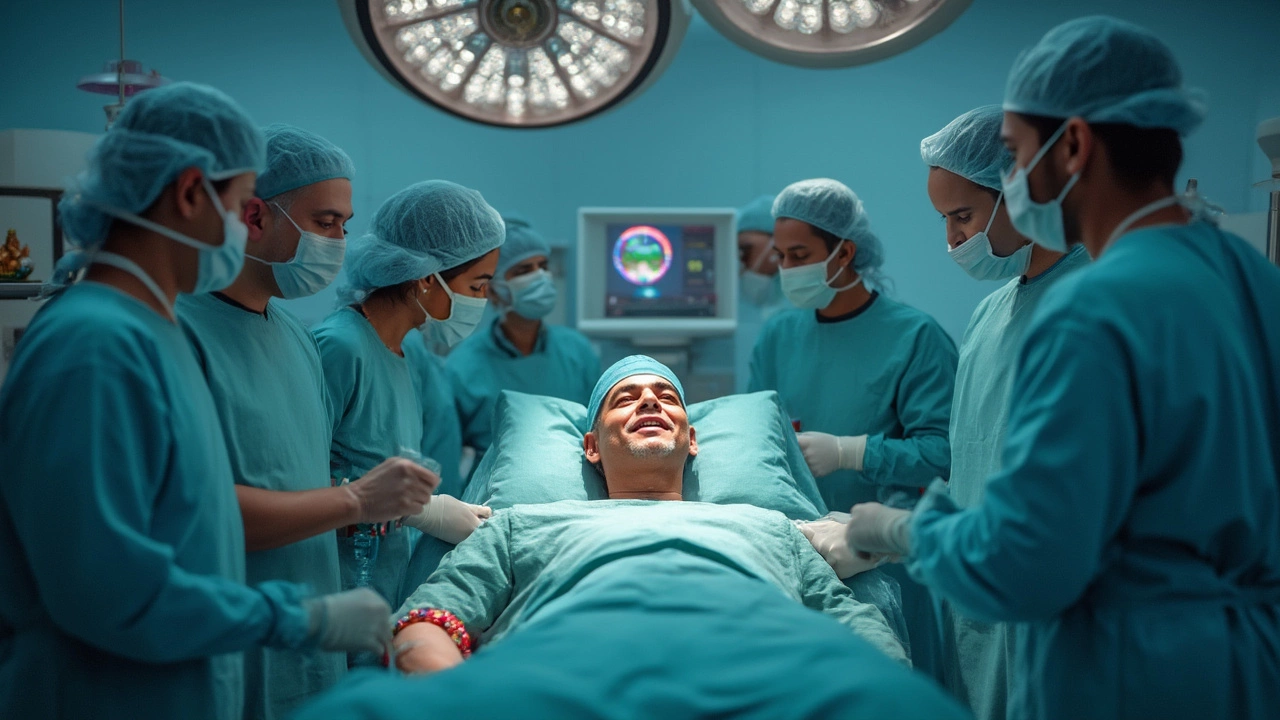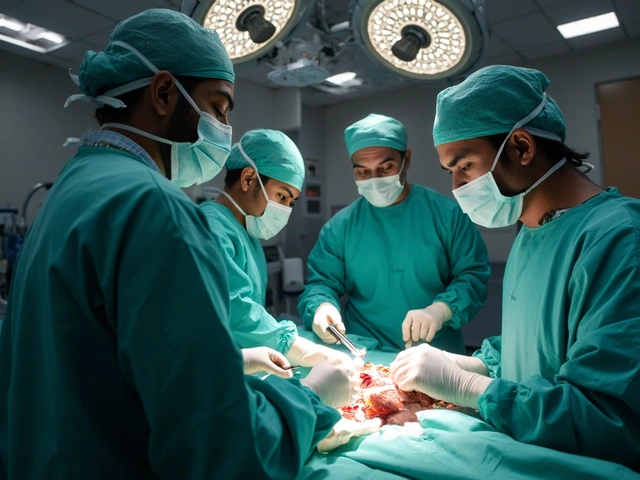If you ever wondered how it feels walking into an operating room, heart exposed, life hanging by a thread, you’re not alone. The very term "open heart surgery" can send chills down anyone’s spine—even though millions have faced it head-on and lived to talk about it. But is survival as rare as the stories make it seem? The hard truth is, it’s not as grim as you might think. Let’s really unpack those survival odds, the risks, the little moments that tip the scale, and what makes one person sail through surgery while another struggles to bounce back.
What Does Surviving Open Heart Surgery Actually Mean?
First off, let’s be clear on what we’re talking about because “open heart surgery” covers a whole lot of territory. This is not just one kind of operation. It’s a term for anything where surgeons open up the chest and work directly on the heart, often stopping it, hooking you up to a heart-lung machine, and doing some seriously fine work on tiny valves or arteries. Think about bypasses, valve replacements, repairs to heart defects—if it has the heart at the center of the drama, it’s in this category.
Survival rates, by the way, mean the percentage of people who come out alive—usually measured in days or weeks after surgery, and sometimes out to a year. So how rare is it? For most open heart surgeries, survival is actually the rule, not the exception. According to the Society of Thoracic Surgeons, the average survival rate for coronary artery bypass graft surgery—the most common open heart surgery—is 98–99% in the short term. That’s not just good, that’s jaw-dropping considering how intricate the whole process is. Valve surgeries, like mitral or aortic valve replacement, have slightly lower—but still strong—survival rates, with averages between 94-97%.
The catch? These numbers are averages. Underneath them, every individual brings their age, health, and medical history. If you’re 62 with diabetes and a history of previous heart attacks, your risk isn’t the same as someone who’s younger with no other illnesses. Also, "surviving" means different things depending on how far out you measure; some people might face complications in the weeks after that don’t show up in the immediate stats. These details matter big time.
Breaking Down the Risks: Who Has Best and Worst Odds?
Look, just being told there’s a risk doesn’t help much unless you know what actually makes that risk go up or down. The surgeon’s skills and where you get treated play a role, but your body and your health define a lot of the path. Age is the tidal force here—older folks (think 75 and up) tend to have lower odds, not just because of the years, but because every other health hitch stacks the deck. Folks with diabetes, kidney disease, poor lung function, or who’ve had prior strokes, bring along baggage that makes surgery harder and recovery slower. Even your weight, whether too high or too low, can push the odds around.
To make it more real, here’s what we know for sure: a massive national U.S. review in 2023 found that patients under age 70, getting their first bypass, without other big-time illnesses, had true mortality rates less than 1%. But add on chronic kidney disease or severe heart failure? The risk goes up five to ten times. Emergency surgeries, where doctors don’t have time to prep, have worse odds than planned ones. Smoking? Still pounding cigarettes just before surgery nearly doubles the risk of complications like pneumonia or wound problems.
| Risk Factor | Increased Risk (%) |
|---|---|
| Age (70+) | 2-5x above average |
| Chronic kidney disease | Up to 9x above average |
| Previous heart surgery | 3-8x above average |
| Diabetes | 2x above average |
| Smoking | 1.7x above average |
What doesn’t really get discussed as much? Support on the outside. People with family or friends who can help them recover, who get decent sleep, who have stable housing—they bounce back much quicker. Small things matter, from eating decent food to walking around a little each day post-op. It’s not magic, but it works.

Game-Changing Advances: Why Survival Rates Are So Strong Now
Here’s something wild—just thirty years ago, open heart surgery was closer to flipping a coin than making a solid bet. Now, often, the survival rates look better than some basic surgeries we all take for granted. Why? Three things: better surgical technique, sharper ICU care, and smarter technology. Surgeons now use smaller cuts, more accurate imaging, and even robots in some big centers. That means less trauma and fewer days lying flat in pain.
If your grandparents still talk about nightmare stories from the 1980s, they’re not wrong for their time. Back then, infection rates were sky high, anesthesia wasn’t nearly as precise, and aftercare was mostly guesswork. Now, specialized teams track everything right down to your blood’s chemical makeup—in real-time. That’s why the big U.S. hospitals report post-surgery infection rates less than 2%, and average ICU stays shrinking from weeks to mere days. Even frail patients are surviving because teams spot problems and tackle them before they spiral.
Transfusions, once routine, are managed much more carefully. Every bag of blood brings a risk of reaction or infection, so careful management there alone boosts outcomes. Doctors scan for and treat clots with medicine before you’re even awake. Pacemakers can be inserted on the fly if the heart’s rhythm gets wonky. You’re not left to fate—you’re watched, monitored, and protected every step.
- Minimally invasive techniques: Many valve surgeries now use tiny ports instead of the old-fashioned chest-split. That means much faster bounce-backs.
- Better anesthesia: Patients now wake up quicker, clearer, and with less nausea.
- Enhanced recovery protocols: Hospitals push you to get up and walk within a day or two, cutting the risk of blood clots by more than half.
So when you hear those wild stories of heart surgery gone wrong, just know medical science has flipped the playbook. The numbers are proof. And families see it every single day in hospital wards around the world.
Boosting Your Own Chances: What Patients and Families Can Really Do
This is where things get personal. There are ways to move your own odds for the better, and it’s not just about crossing your fingers and hoping for a gifted surgeon. Most people don’t realize just how much pre-surgery choices matter. Good prep isn’t about squeezing your stress ball in a waiting room—it’s letting doctors know about every medication, even the harmless-looking vitamin you grabbed off the shelf last week. Some supplements seriously mess with bleeding or the way anesthesia works.
If your doctor gives you tablets or a special soap for before surgery, stick to the plan like your life depends on it—because, sometimes, it does. Infection prevention here starts before you even enter the hospital. And about stopping smoking—if you can quit just four weeks before the surgery, studies prove your risks drop dramatically, even if you’ve smoked for decades.
Right after surgery, follow the team’s advice about movement and breathing exercises. Those coughs and leg squeezes actually keep pneumonia and clots at bay. Tell your family or friends: visiting helps. People who get more visits from loved ones after surgery come to life faster and handle pain better. Recovery at home is all about balancing activity and rest—don’t push yourself too hard, but don’t spend all day on the couch either.
Nutrition matters, too. Eat protein-rich foods to help your body heal up those wounds and resist infections. And don’t skip those follow-up visits. Doctors catch problems early if you’re consistent—turning big issues into easy fixes. Most survivors aren’t just lucky. They, their families, and their medical teams work together, watch the details, and play every angle.
For anyone keeping score, here’s how to stack the deck in your favor:
- Quit smoking, even temporarily, before surgery.
- Stay active as your medical condition allows before surgery—fit people recover quicker.
- Follow all medication and nutrition instructions closely.
- Ask questions. Understand what’s happening and why at every step.
- Get support lined up for after your operation—rides, meals, check-ins.
So, is it rare to survive open heart surgery? With the numbers where they are today, survival is not rare—it’s what usually happens. But beating the odds always feels like a win, and with the right information and choices, you can nudge those odds even more in your favor.

 Inspiring Stories of Stage 4 Cancer Survivors: Breaking the Odds
Inspiring Stories of Stage 4 Cancer Survivors: Breaking the Odds
 Unveiling the World's Most Common Illness and Its Impact on Medical Tourism
Unveiling the World's Most Common Illness and Its Impact on Medical Tourism
 Can You Choose a Baby’s Gender with IVF? Complete Guide
Can You Choose a Baby’s Gender with IVF? Complete Guide
 Hardest Type of Heart Surgery: What Really Tops the List?
Hardest Type of Heart Surgery: What Really Tops the List?
 When Is ADHD the Hardest? Understanding Age, Struggles, and Strategies
When Is ADHD the Hardest? Understanding Age, Struggles, and Strategies